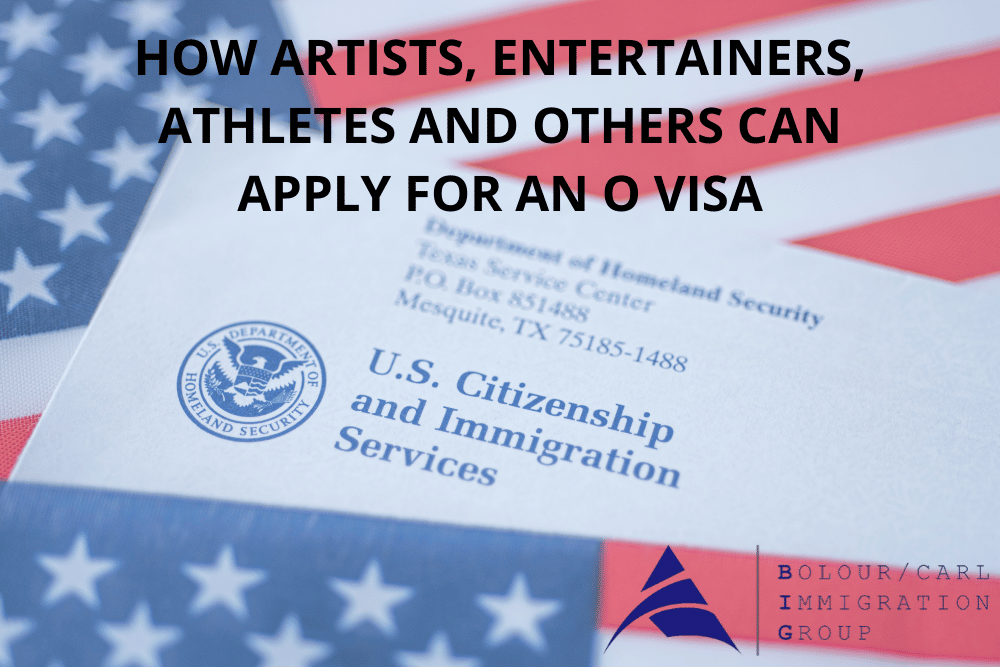
If you have “extraordinary ability” in the arts, athletics, sciences, education or business, or you have been recognized nationally or internationally for achievements in the motion picture or television industry, you may be able to obtain an O-1 visa. This visa will allow you to work temporarily in the United States in your field of extraordinary ability.
General Requirements for O-1 and Related O Visas
United States Citizenship and Immigration Services (USCIS) defines extraordinary ability in the fields of science, education, business or athletics as “a level of expertise indicating that you are one of the small percentage who have arisen to the very top of the field.” If you fit into this category, you can apply for an O-1A visa.
O-1B visas, generally known as artist visas, are for individuals with extraordinary ability in the arts or major achievements in the motion picture or television industry. USCIS equates extraordinary ability in the arts with “distinction,” defined by the agency as “a high level of achievement” as evidenced by “a degree of skill and recognition” that has rendered the individual “prominent, renowned, leading or well-known” in the field. The motion picture and TV industry bar is similar: applicants must have demonstrated extraordinary achievement to the extent that they are “recognized as outstanding, notable or leading.”
Individuals who will accompany an O-1 artist or athlete to assist in a specific event can apply for an O-2 visa, while O-3 visas are intended for spouses or children of O-1 and O-2 visa holders.
Initial Period of Stay
Initially, you may be approved for an O-1 visa covering the amount of time needed to complete an event or activity, not to exceed three years. In addition, you may be allowed in the country up to 10 days before and up to days after the duration of the validity period, but you may only work during the validity period. An actor who is coming to the United States for a film production, for instance, might be approved for an O-1 visa for the expected filming period plus a brief stay at the beginning and end.
Application Process for O-1 Visas
For you to obtain an O-1 visa, a U.S. employer, U.S. agent or foreign employer through a U.S. agent must first file Form I-129, Petition for Nonimmigrant Worker on your behalf. This should be done at least 45 days before the date of employment (but not more than a year before employment begins). The petitioner must submit several pieces of supporting evidence, including a written opinion, called a consultation, about your ability from a peer group, such as a labor organization, or an established expert in your field. For applicants within the motion picture or television industry, a consultation from both a labor group and a management organization are required. Other required documents include a copy of any written contract between you and the petitioner or a summary of the terms of the oral agreement under which you will be employed. The petitioner must also provide a description and itinerary, with beginning and ending dates, for the applicable activities.
Additional evidence of your extraordinary ability must be provided. If you are the recipient of a major, internationally recognized award in your field – such as a Nobel Prize, Pulitzer Prize, Academy Award, Grammy Award or an Olympic medal – this will suffice. Otherwise, three pieces of evidence are required; these can include but are not limited to membership in a trade association that requires outstanding achievements of its members; published material about you in a major publication; receipt of other prestigious awards that do not quite rise to the level of those mentioned previously; evidence of original scientific, scholarly or business-related contributions of major significance to the field; or significantly high salary/compensation.
Extending Your Stay
If the work that you are here to do lasts longer than anticipated, the petitioner can apply to extend your stay in increments of up to one year. Extensions are common, for instance, among foreign national professional athletes, who often play in the United States for a decade or more. If you extend your stay to complete the same event or activity, your employer or agent must file a new Form I-129 with a copy of your Form I-94 Arrival/Departure Record and a statement explaining the reasons for the extension. In the event that you to change employers, the new employer must file a new Form I-129.
If you are here on an O-1 sports visa and you are traded to a different team, employment authorization will continue with the new team for 30 days, during which time the new employer must file a new Form I-129. The act of filing the form extends your employment authorization at least until your petition is processed. However, if the new team does not file the form within 30 days, you will lose your employment authorization.
Note that if you are extending your stay and you are accompanied by your spouse and/or children, they must file Form I-539, Application to Extend/Change Nonimmigrant Status if they are to remain in the country with you.
After Approval
Your employer or agent will be notified upon the approval of the petition. At that point, you can apply for your O-1 visa by completing Form DS-160, Online Nonimmigrant Visa Application electronically and bringing a copy to your interview at a U.S. embassy or consulate, usually in your country of residence.
If you meet the qualifications, O visas are a great path to gain entry into the United States. Eventually, you may be able to apply to adjust your status and become a permanent resident.
Bolour/Carl Immigration Group is a full-service immigration law firm. If you would like to discuss artist visas, sports visas, or other O visas with an immigration attorney, contact us at 323-857-0034 or [email protected].

